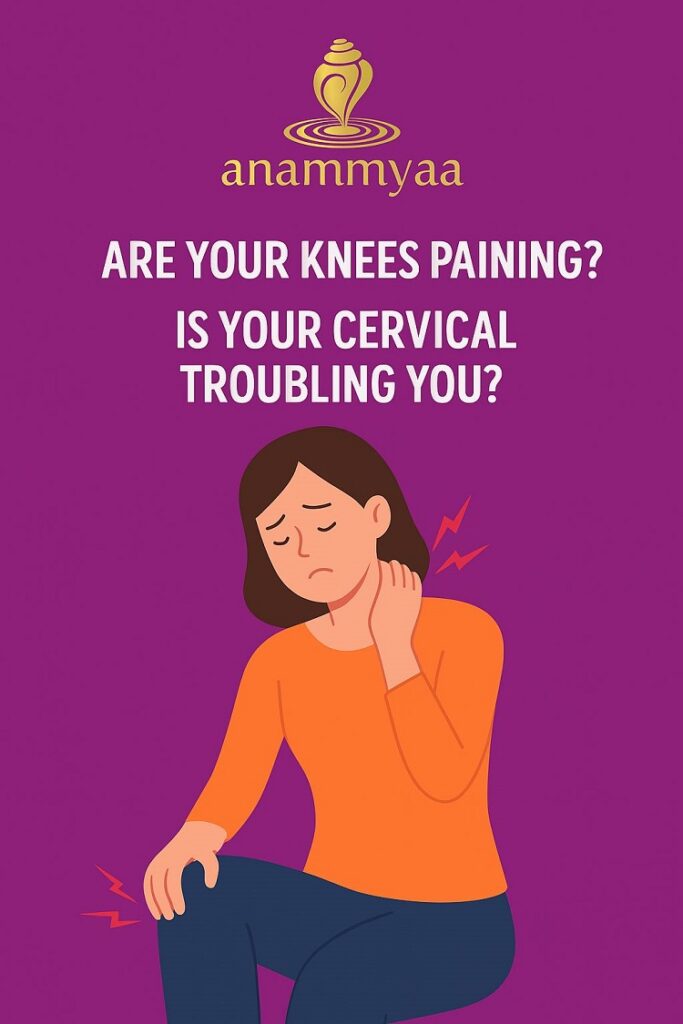The rainy season brings relief from the summer heat, but it also leads to joint discomfort—especially in the knees and cervical spine (neck). Many people experience pain, stiffness, and swelling during this time. Ayurveda explains these health challenges as a result of aggravated doshas, lifestyle changes, and environmental factors.
Why Do Knee and Cervical Pains Increase in the Rainy Season?
According to Ayurveda, the rainy season (Varsha Ritu) leads to an aggravation of Vata dosha, especially when combined with Kapha accumulation. The reasons include:
- Increased Moisture and Cold
- The damp and cold weather affects the joints, which are already prone to stiffness. Vata, being cold and dry, becomes aggravated, leading to pain and discomfort.
- Lack of Sunlight and Reduced Activity
- Less exposure to sunlight weakens digestion and reduces body warmth, resulting in stagnation in muscles and joints.
- Improper Diet and Water Quality
- During rains, digestion becomes sluggish. Intake of heavy, cold, and fermented foods increases Kapha, contributing to inflammation and water retention in joints.
- Stress and Poor Posture
- Long hours of sitting, working from home, or poor posture during wet and cold weather strain the cervical spine, causing neck pain.
- Pre-existing Conditions
- Individuals with arthritis, spondylitis, or past injuries often experience flare-ups during the rainy season.
Precautions as Per Ayurveda
Maintaining balance during the rainy season is essential to prevent joint and cervical issues. Ayurveda recommends specific dietary and lifestyle practices:
1. Dietary Guidelines
- Prefer warm, light, and easily digestible meals like soups and herbal teas.
- Include spices that enhance digestion and reduce stiffness.
- Do not have curd and raw foods at all, as they increase Kapha and worsen joint inflammation.
- Tea and coffee further aggravate the conditions, as they disturb Vata (joint issues) and Pitta (inflammations), leading to increased pain and swelling.
- Drink lukewarm water infused with herbs to improve digestion and circulation.
2. Daily Routine
- Maintain regular meal times and sleep schedules.
- Apply warm oil massage on the knees and neck regularly to keep joints lubricated and tissues nourished.
- Practice gentle stretching and breathing exercises to enhance circulation and flexibility.
- Keep the knees and neck covered and warm during rainy outings or cold weather.

Panchakarma Treatments to Be Done on a Regular Basis
For effective and long-term management of knee and cervical pain, Panchakarma therapies are highly recommended. These treatments help balance aggravated doshas, strengthen joints, and reduce pain.
1. Basti (Medicated Enema)
The most effective treatment for Vata disorders, this therapy helps strengthen joints and muscles while balancing the doshas.
2. Kati Basti
Warm oil is retained over the lower back or knees to relieve pain, stiffness, and inflammation.
3. Greeva Basti
Warm oil is applied and retained on the neck area to soothe tension, improve blood flow, and reduce cervical discomfort.
4. Abhyanga (Oil Massage)
Regular oil massage over affected joints nourishes the tissues, improves circulation, and softens stiffness.
5. Swedana (Steam Therapy)
Gentle steam therapy helps open blocked channels, relax muscles, and reduce inflammation, complementing other treatments.
6. Herbal Formulations
Ayurvedic herbs are advised to support joint health, reduce inflammation, and balance doshas when used alongside therapies.
These Panchakarma treatments should be done on a regular basis under the guidance of an expert Vaidya to achieve optimal results.
Important
Any condition that persists for more than 3 months is considered chronic and requires extensive treatments under the supervision of an expert Vaidya. Timely intervention is essential to prevent long-term damage and to restore health.
The rainy season can disturb the body’s balance, triggering knee and cervical pain due to aggravated Vata and Kapha. Ayurveda provides holistic solutions through dietary discipline, routine care, and regular Panchakarma therapies. Avoiding curd, raw foods, tea, and coffee, staying warm, and following prescribed treatments can help you stay active and pain-free.
Chronic conditions need thorough, long-term care—so consult a Vaidya and follow the right treatment plan for lasting relief and wellness throughout the season.
For consultation call Anammyaa Wellness : 95600-24178 ( Keep an hour for the consultation)



